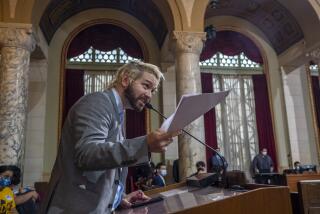Parks Denies Charges in Report
Los Angeles Police Chief Bernard C. Parks on Tuesday dismissed as blatantly false a report by the LAPD’s civilian watchdog that concluded the chief sought to withhold information from county prosecutors investigating the Rampart corruption scandal.
Parks, swarmed by reporters after a meeting of the Los Angeles Police Commission, also denied findings by Inspector General Jeffrey C. Eglash that he made misleading statements about the controversy at a news conference last year and then later during the inspector general’s investigation into the matter.
“At no time was the D.A.’s office ever not given information they wanted,” said Parks, adding that he had not yet read the inspector general’s report. “I will categorically state that I have not misled the public nor any member of the commission or this department.”
Eglash concluded otherwise after a 10-month investigation that included a review of documents and interviews with 28 witnesses.
The commission discussed the inspector general’s report during a closed meeting Tuesday, but put off any action on the matter until its next meeting, officials said. It will be up to the commission to determine what discipline, if any, to impose on the chief. By law, the commission would have to impose any discipline within a year of the date of the chief’s alleged misconduct. The statutory deadlines on some of Parks’ alleged offenses will expire within the next two weeks.
Eglash’s 17-page confidential report, which was obtained by The Times, gave Parks’ critics ammunition.
Ramona Ripston, the executive director of the ACLU of Southern California, said Eglash’s report reinforces her long-standing assertion that the chief and the LAPD cannot be trusted.
“[The] revelations that Chief Parks refused to cooperate with the district attorney’s office in its Rampart investigation, then publicly misrepresented the Department’s actions, constitute yet another piece of compelling evidence that the chief is incapable of leading the Department through the reform process,” the American Civil Liberties Union leader said in a prepared statement.
LAPD union officials, who have clashed with the chief over many issues, were more subdued in their public reaction. While some members privately advocated calling for the chief’s ouster, the president of the Police Protective League tempered her remarks.
“We are deeply disturbed by the inspector general’s allegations that Chief Parks may have made misleading statements at a press conference and to the inspector general’s office,” said Mitzi Grasso, the president of the police union. “Police credibility is vital. Without it, public trust evaporates.”
Grasso added: “We urge the Police Commission to consider the inspector general’s allegations in the context of Chief Parks’ long career of exemplary public service. People are imperfect. . . . We expect the chief to be held to same disciplinary standards as those applied to all other Los Angeles police officers.”
Some police officers and union officials noted that the chief has fired officers in the past for making false and misleading statements.
At the Newton Division, where police had gathered to hear Mayor Richard Riordan speak on an unrelated matter, several officers wondered aloud if Parks would be held to the same standard of conduct as they are.
“If it’s being applied to us,” said one plainclothes detective, “it should also apply to the chief.”
Riordan deflected questions from reporters. “I am not going to be the judge, jury and executioner,” the mayor said.
The commission last year directed Eglash to investigate the chief’s actions after then-Dist. Atty. Gil Garcetti accused the LAPD of refusing to cooperate with prosecutors.
According to some of the witnesses interviewed by the inspector general’s office, Parks sought to deny county prosecutors access to information regarding the unfolding corruption investigation. Parks wanted to deal exclusively with the U.S. attorney’s office in connection with the ongoing corruption probe, Eglash reported.
When the feuding between the district attorney and LAPD became public, Parks unjustly accused Garcetti of fabricating the controversy, Eglash concluded.
Eglash reported that the LAPD denied at least four requests from local prosecutors for information. He noted, however, that Parks maintains that much of that information had previously been in the district attorney’s possession or was turned over shortly afterward.
Parks and Eglash have previously clashed over the level of access the inspector general should have when investigating alleged wrongdoing by police officers. The chief argued that the inspector general should be denied some material in ongoing criminal probes, while Eglash contended he needed free rein.
*
Times staff writer George Ramos contributed to this story.
More to Read
Sign up for Essential California
The most important California stories and recommendations in your inbox every morning.
You may occasionally receive promotional content from the Los Angeles Times.











